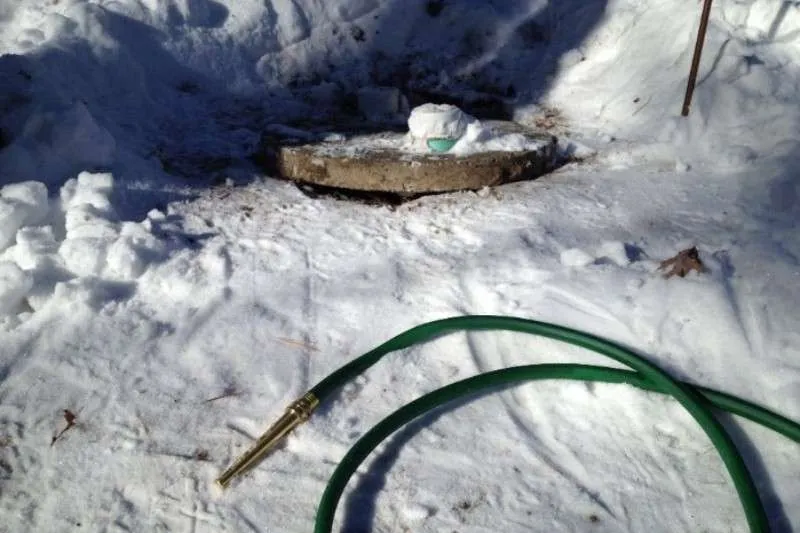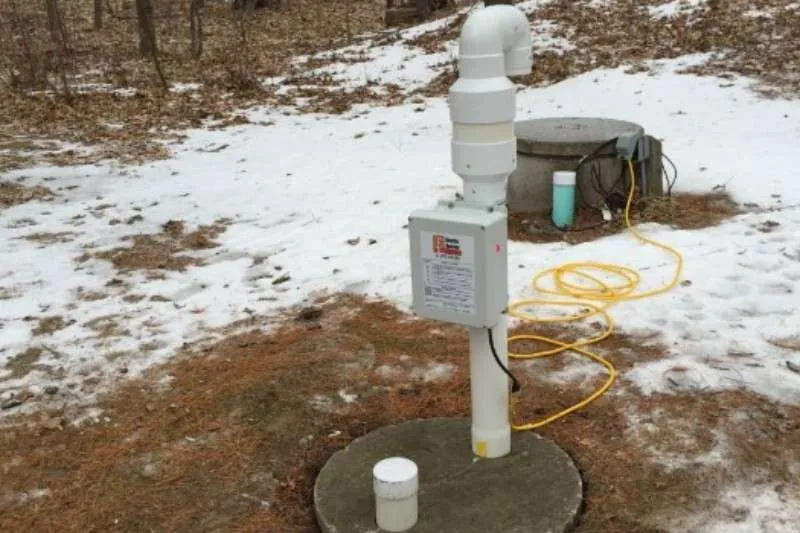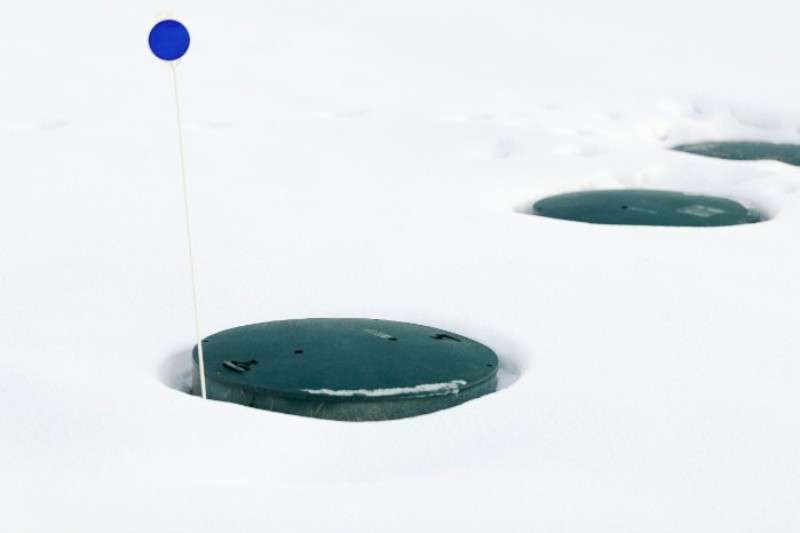When winter’s icy cold temperatures start to take over, many of us don’t think twice about the septic tank underneath our property, but it should be at the top of our minds this season. Septic tanks can freeze and break in extreme weather conditions if improperly maintained and protected – leading to major problems and hefty repair costs.
To help you out, we have compiled all you need to know about preparing your septic system for wintertime so that everyone can avoid costly repairs related to frozen or damaged systems.
Introduction to septic tank freeze-ups
Septic tank freeze-ups can be a major problem for homeowners in cold climates. When temperatures drop to freezing levels, the water inside the septic tank can become solid and cause a blockage. This can lead to costly repairs or even complete replacement of the system. Fortunately, there are some steps that homeowners can take to reduce the likelihood of experiencing a septic tank freeze-up.
The potential impact of freezing temperatures on septic systems can be severe, resulting in costly repairs or even complete replacement. In extreme cases, the system itself may become damaged beyond repair due to the pressure caused by the accumulated ice and water inside the tank. This can lead to raw sewage entering your home and contaminating drinking water.
It is important to prevent septic tank freeze-ups to avoid costly repairs, environmental contamination, and other negative impacts. Homeowners should check the forecast before temperatures drop below freezing, which can help them anticipate any problems with their system. Additionally, several other measures can be taken to reduce the likelihood of a septic tank freeze-up.
Insulating your septic tank and system components
Insulating your septic tank and system components is key in preventing septic tank freeze-ups. It is important to understand the role of insulation in preventing freezing temperatures from adversely affecting your septic system. Properly insulating the various components of your system can help ensure that it continues to run smoothly and effectively, even during cold weather.
The role of insulation in preventing septic tank freeze-ups is to protect the components from the cold air outside, which can cause freezing temperatures inside the system. Insulating each component properly can help prevent very cold air temperatures or any temperature extremes from adversely affecting your septic system. This will ensure it does not experience freeze-ups or other problems during cold weather.
A few options are available when insulating septic tanks, pipes, and other system components. Foam pipe insulation can be used to protect drainpipes from freezing temperatures. Insulation blankets can also be wrapped around the septic tank to provide an extra layer of protection. The septic tank’s exterior walls and other exposed surfaces can also be covered with insulation to protect it from cold air.
Whatever type of insulation you choose for your septic system, ensure it is properly sealed and secured to provide the most effective protection against freezing temperatures. While insulating your septic system will help prevent freeze-ups, monitoring the temperature in your septic tank and system components throughout cold weather is important. This will allow you to take immediate action if any areas become too cold and are at risk of freezing.
Proper landscaping and drainage around your septic system

It is important to take proactive steps to avoid septic tank freeze-ups. Here are some of the most effective ways of preventing freezing problems from this from happening:
1. Proper landscaping and drainage around your septic system. Ensure all rainwater, runoff, and other water sources are directed away from the septic system. This will help reduce water infiltration and prevent frost buildup in the soil surrounding the tank.
2. Ensuring proper grading and surface drainage direct water away from the septic system. Ensure that bare soil in your yard is graded properly so that rainwater, runoff, and other water sources are directed away from the septic system.
3. Planting appropriate vegetation around the septic tank and drain field to provide natural insulation. By planting trees, shrubs, and other plants around your septic system, you can help protect the soil settling the ground from freezing temperatures and prevent damage to the system.
Following these steps can keep your septic tank from freezing over and help protect your system from costly repairs. Contact a professional if you have questions about properly maintaining your septic tank.
Maintaining regular septic system use during cold weather
During cold weather, it’s important to regularly use your septic tank and septic system to avoid freeze-ups. The benefits of regular water usage are twofold: not only can you help prevent the danger that a septic tank freeze-up poses, but you can also keep your frozen septic tank from overflowing or clogging.
Here are at least a foot few tips to help maintain consistent water flow through your septic system during winter months:
- Ensure adequate insulation around all septic tank parts and piping that may be exposed to cold temperatures. Exposed pipes should be wrapped in foam insulation or insulated with other materials like fiberglass.
- Run water through all drains in cold weather for at least 10 minutes daily to ensure the pipes remain clear and heated.
- Check the temperature of your septic tank and piping frequently during winter months. If it’s below freezing, consider using a space heater or other heat source around the tank and piping to keep it warm.
- If you live in an area where temperatures dip below freezing, consider investing in a heated septic tank blanket or insulated cover to help prevent freeze-ups.
- Use deicers or antifreeze around the tank and piping to prevent liquid freezing.
By following these tips, you can help ensure that your septic tank and system remain functional during the cold winter and avoid costly repairs from freeze-ups. Contact a professional for advice if you have questions about maintaining your septic tank.
Addressing frozen septic system components
Prevention is the best way to avoid septic tank freeze-ups. To keep your system running smoothly, you should take steps to protect it from freezing temperatures and maintain proper insulation:
1. Ensure your septic tank and its components are well insulated. If necessary, add more insulation or create a heated shelter for the tank.
2. Know which areas of your septic system are most vulnerable to freezing and take steps to insulate them if necessary. This includes pipes, tanks, lines, and other components.
3. When winter arrives, disconnect hoses from outdoor spigots and store them away until springtime, when they can be used again.
4. Keep your system in good working order year-round by performing regular maintenance and cleaning.
If a freeze-up does occur, it is important to identify the source of the problem and thaw it safely before attempting any repairs or maintenance on your septic system. This may involve using a heat lamp, a hair dryer, or other heating device. It is also important to remember that some components of your septic system may not be able to withstand the heat.
Finally, if you cannot identify and safely thaw frozen pipes, tanks, and other components, it is best to call in a professional. A qualified technician will be able to identify the source of the problem and help you avoid further damage or costly repairs. With their knowledge and expertise, they can also recommend preventative measures to avoid future freeze-ups.
Preparing your septic system for winter

To avoid septic, it’s freeze-ups, it’s best to prepare your septic system for winter before the cold weather arrives. Taking a few simple steps now can save you time and money in the long run. Here are some tips for getting your septic system ready for winter:
1. Check all gutters and downspouts. Make sure they are draining water away from your septic tank, as pooling water can cause the ground to freeze, which could damage your system.
2. Insulate any exposed piping or other components of hot water in your system that could be affected by cold temperatures. This will help protect them from freezing.
3. Schedule a fall inspection and maintenance of your system. Have a septic professional check for any potential problems or weak points in your system that could be caused by cold weather.
4. Ensure you have the appropriate chemicals to treat your septic tank during winter, such as anti-freeze and other freeze-resistant products.
These simple steps can help you avoid septic tank freeze-ups and keep your system running smoothly throughout the winter months. If you have any questions about preparing your septic system for winter, consult a professional to ensure everything works. Taking preventive measures now will save you time and money in the future.
FAQs
Can my septic tank freeze during cold weather?
Septic tanks can freeze during cold weather if not properly insulated or maintained. Preventive steps such as insulating exposed pipes and scheduling regular maintenance will help prevent the system from freezing.
How can I insulate my septic tank and system components to prevent freezing?
You should insulate any exposed pipes and other system components that could be affected by cold temperatures. If necessary, you may also need to create a heated shelter snow cover for the tank.
What landscaping techniques can help prevent septic tank freeze-ups?
Landscaping techniques such as diverting water from your septic tank and providing appropriate insulation for exposed pipes can help prevent freeze-ups. Finally, remember to store all hoses disconnected from outdoor spigots until springtime.
How does the regular septic system use help prevent freezing?
Regular maintenance and cleaning of your septic system can help prevent freezing. This includes checking for any potential problems or weak points in the system, using anti-freeze and other freeze-resistant products to prevent frozen septic systems, and scheduling regular inspections. A qualified technician will also be able to identify the source of a problem and recommend preventative measures.
What should I do if my septic system components freeze?
If your septic system components freeze, you should act quickly to try and thaw them safely. You may use a heat lamp, hair dryer, or other heating device. If you cannot identify and thaw the frozen septic systems components, calling a professional technician for help would be best. They will be able to identify the source of the problem and suggest preventative measures to avoid future freeze-ups.
How can I prepare my septic system for winter?
Preparing your septic system for winter involves taking a few simple steps. This includes checking all gutters and downspouts, insulating exposed piping or other system components that could be affected by cold temperatures, scheduling a fall inspection and maintenance, and ensuring you have the appropriate chemicals to treat your septic tank during winter.
Conclusion
Winter may seem cold and unforgiving, but with a few precautions and maintenance activities, your septic tank can survive the winter without incident. Proper care includes ensuring that the lid is sealed tightly, regularly checking the inlet and outlet screens for clogs or blockages, using an insulating wrap to keep the tank warm throughout the winter months, avoiding heavy snowfall buildup on top of the tank, and potentially even investing in a 12-volt heater specifically designed for outdoor pumps when temperatures dip below zero continuously.


